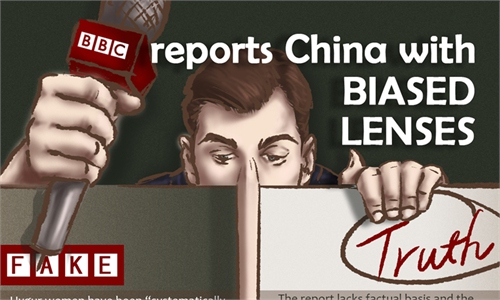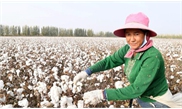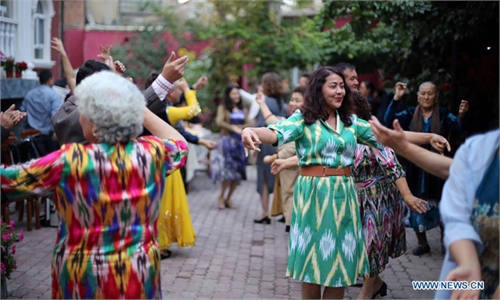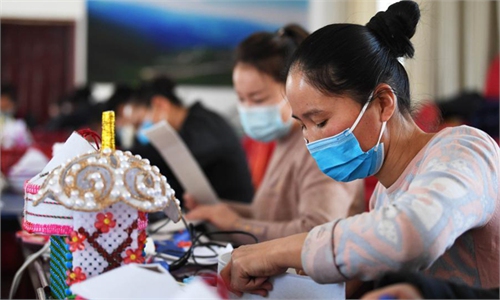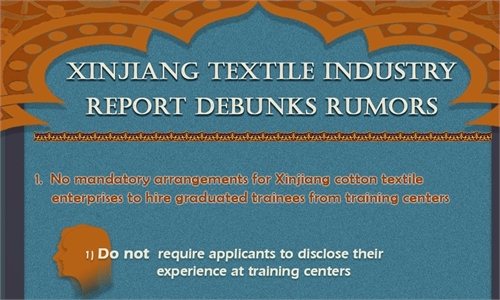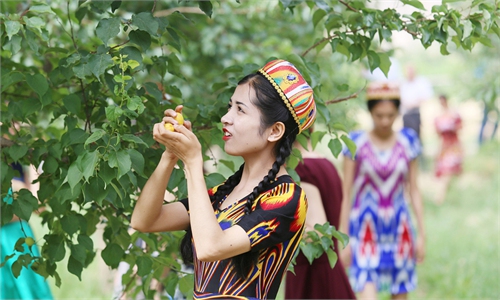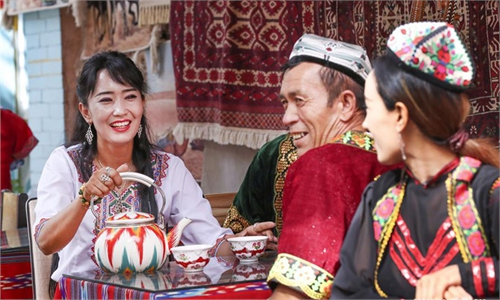Anti-China tactics on BBC bust 'objective media' facade
Analysis of 41 Xinjiang stories reveals news manipulation
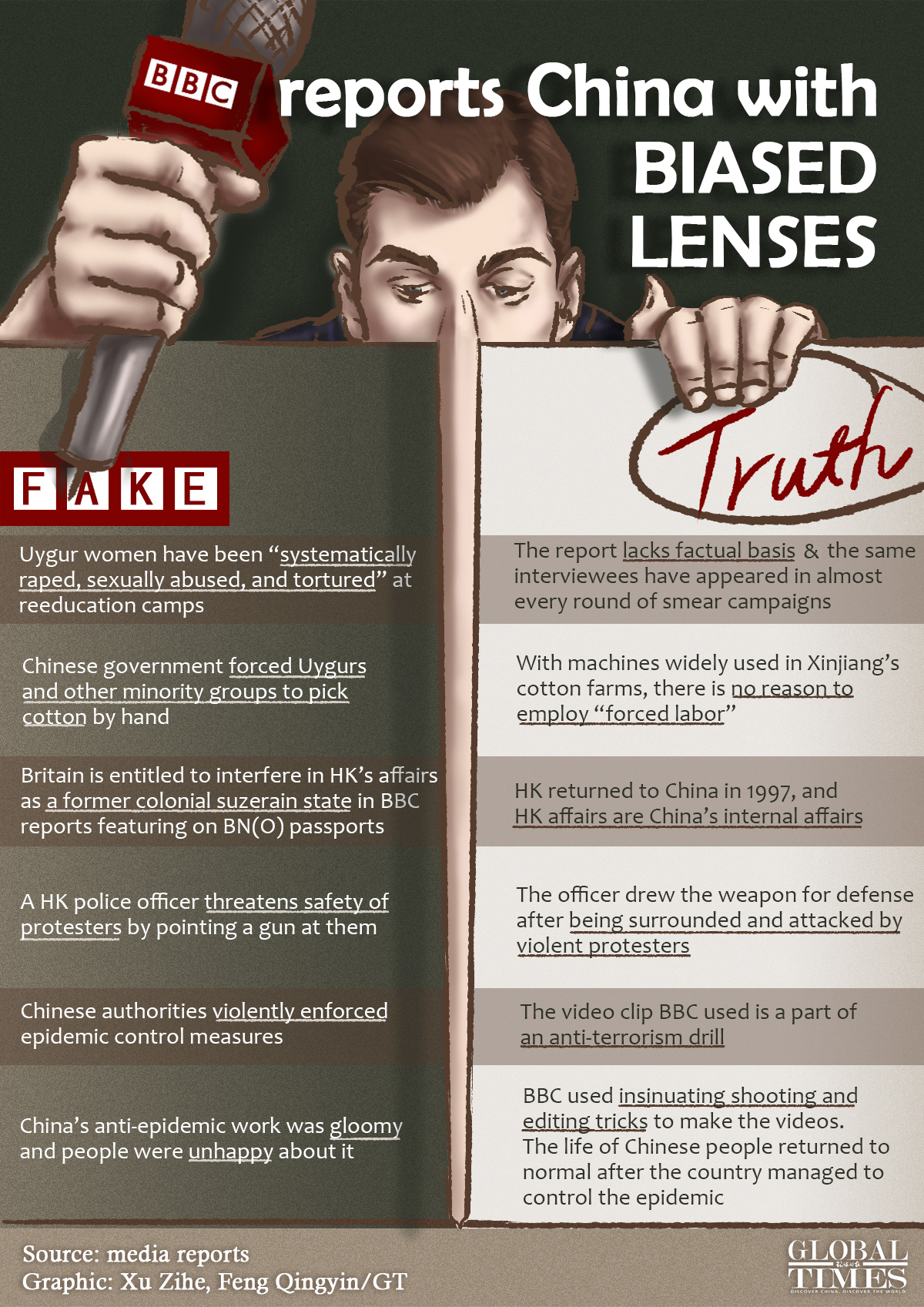
How does the BBC apply “results before evidence” principles when reporting on China? Graphic: Xu Zihe, Feng Qingyin/GT
Analysts said the UK has slapped its own face for boasting about "freedom of speech" and "professional journalism," as the BBC has joined its government in geopolitical strategy to contain China.
The BBC recently put itself in the spotlight of the international community either by accusing China of "mass rape" in the Xinjiang Uygur Autonomous Region based on only one interviewee's lies or by its distorted coronavirus reporting about Wuhan.
China's Foreign Ministry made solemn representations to the BBC's Beijing office for reports politicizing the epidemic, which used a video with an attempt to show epidemic control authorities violently enforcing epidemic control measures and violating human rights, but turned out to be a video of an anti-terrorism drill.
Although the BBC on Thursday defended its reports as "accurate and fair" while rejecting accusations from the Chinese Foreign Ministry, it is undeniable that the organization has been deeply engaged in the "narrative war" against China and become a hub of rumors to defame China by hyping topics of Xinjiang, Hong Kong and Tibet, analysts said.
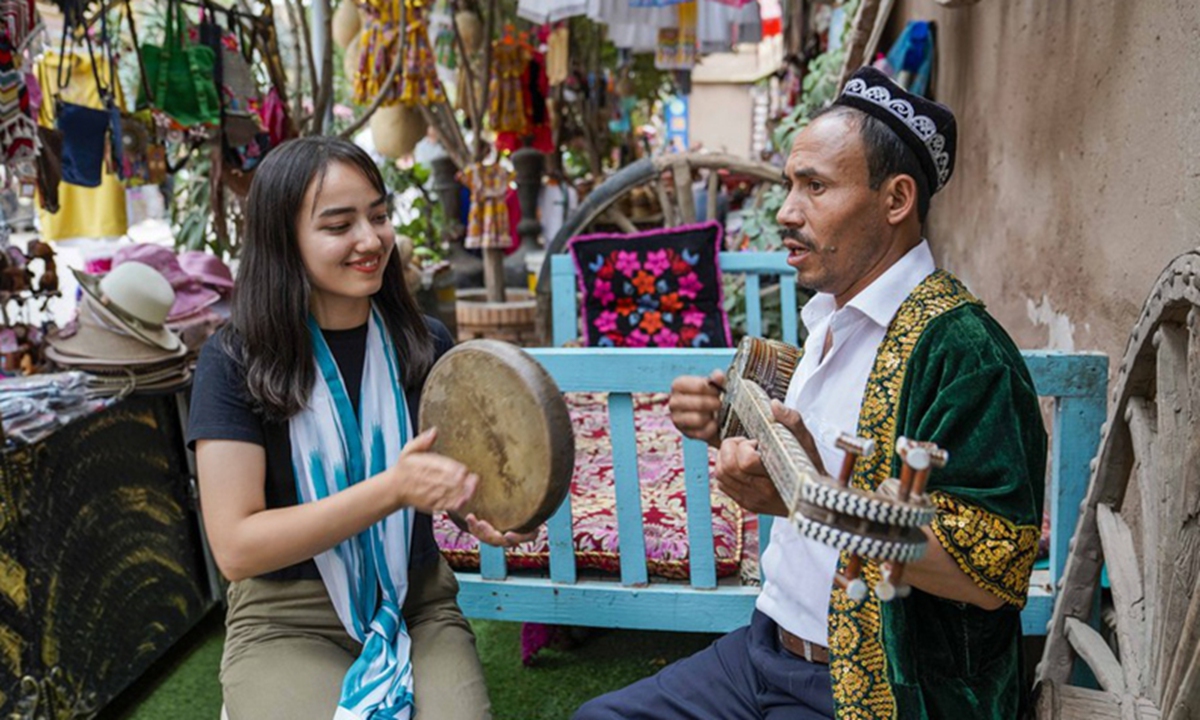
Local residents who are involved in the tourism business play music for tourists in the old town of Kashgar, northwest China's Xinjiang Uygur Autonomous Region, July 9, 2019. Photo:Xinhua
BBC's reports on China's Xinjiang may offer readers a clue for how the media has made fake news without journalism ethics. After putting "Xinjiang" as key words in BBC's search engine on its website, the Global Times has found at least 41 English-language articles over the past six months since last August, which babbles about lies from "forced labor" to the latest "systematical rape."
Change of testimonies
BBC's recent report claiming "mass rape" took place in the vocational training and education centers in China's Xinjiang has also been found to be untenable. The so-called victims and witnesses were found to have changed their “testimonies” many times with contradictory details.
Tursunay Ziyawudun, the only one who claimed to be a "victim" of "gang-rape" in the BBC report, said that she lived with her husband in Kazakhstan and her passport was confiscated when she returned to Xinjiang. She went to the training center in 2018 and left it at the end of that year. She then went back to Kazakhstan and fled to the US.
The Global Times has found that this is not the first time that Tursunay appeared in Western media reports. When Tursunay was first interviewed in Almaty, Kazakhstan on October 15, 2019, she made no allegations of rape or overly harsh treatment.
Then, in an interview with the US-based Buzzfeed News on February 15, 2020, Tursunay said, "I wasn't beaten or abused." These remarks contradicted BBC’s report of many “distressing” details.
In the BBC report, Tursunay claimed that her earrings had been “yanked out” causing her ears to bleed. But in the Buzzfeed report, this part was described as the police asking the women to take off their earrings.
A website named Moon of Alabama listed all the changes in Tursunay’s “testimonies” and noted that it was when the US-based and funded Uyghur Human Rights Project found her and helped her go to the US in September 2020 that the woman suddenly became a victim of "gang-rape" in a "camp" in the BBC report.
Sayragul Sautbay, the “witness” in the BBC report, has also been found to be telling lies. In an interview with The Globe and Mail in August 2018, she said she did not see violence, but when interviewed by Haaretz, the woman claimed to have seen “all kinds of torture” in the centers. Also, she told The Globe and Mail that people in the centers suffered hunger and no meat was provided in the camp. But in an interview with Al Jazeera in December 4, she said there were three meals a day at the centers.
These different details raised questions on the credibility of her stories and also her claims in the BBC report.
Sayragul Sautbay’s identity also went from being an “instructor” in the training center in one report to “former detainee” in other reports in different Western media.
However, the Global Times debunked Sayragul’s lies in December 2019. She was found never to have been to any training centers in Xinjiang and is on a list for suspected crimes of illegal border crossing and fraud.
Sayragul’s stories changed after she was found by the US-backed anti-China organization World Uyghur Congress, the Moon of Alabama website said.
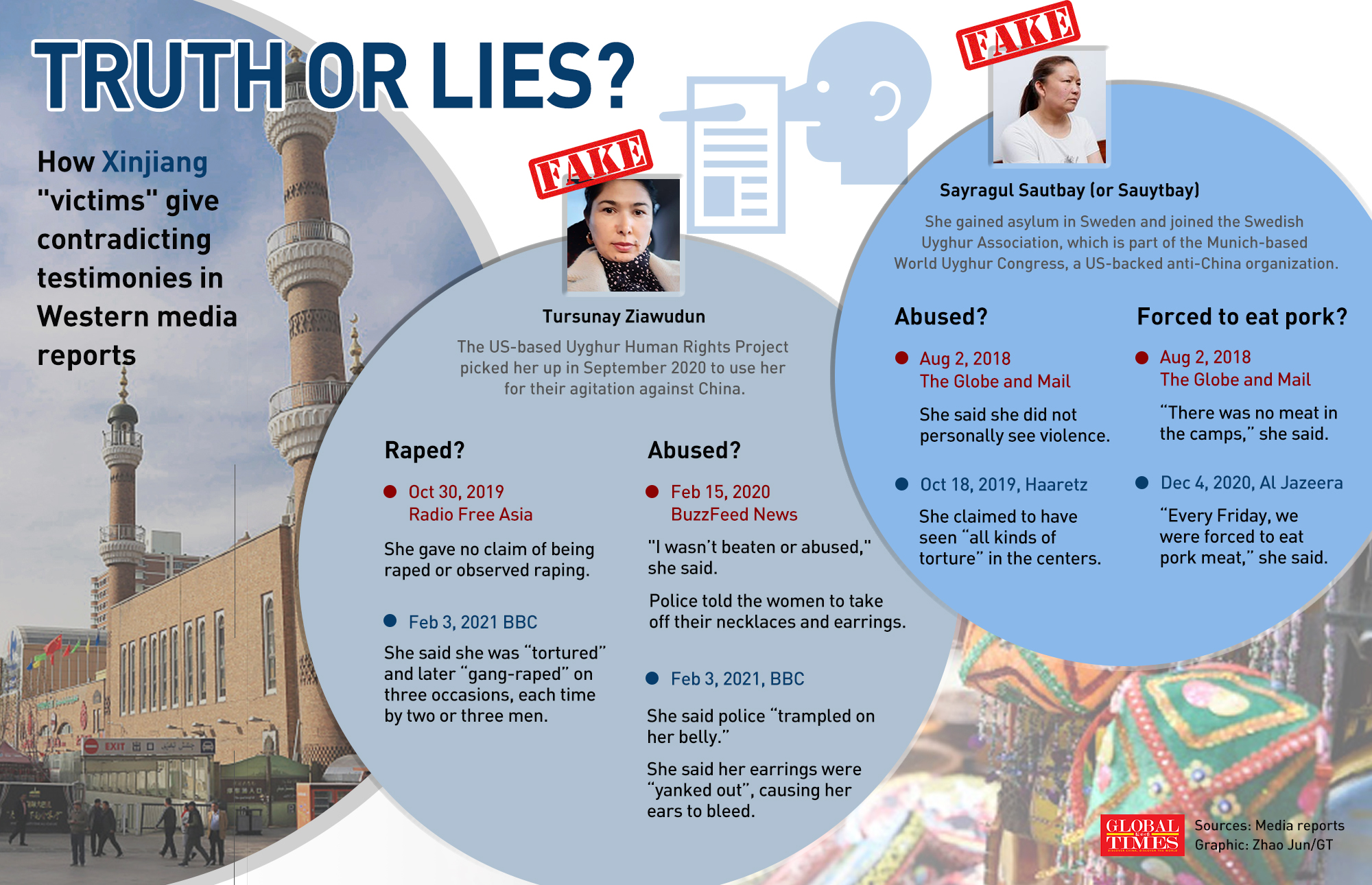
Graphic: Zhao Jun/GT
Hub for spreading rumors
Aside from untenable interviewees, the BBC has also been found playing as a platform to spread lies of Xinjiang made by other Western media. For example, after putting "Xinjiang" as key words in BBC's search engine on its website, the Global Times has found at least 41 English-language articles over the past six months since last August, which babbles about lies from "forced labor" to the latest "systematical rape."
Some 30 of these 41 articles that BBC published weirdly have no bylines. These anonymous written pieces usually consist of second-hand quotes from various organizations, reports or other Western and US media reports, making this self-claimed "accurate and fair" media more like an anonymous site busy with making up, editing, processing and spreading trustless information in terms of Xinjiang coverage.
BBC reporters John Sudworth and Matthew Hill were among the authors of its few remaining signed articles. Unfortunately, few of these stories are based on the reporters' interviews with residents living in Xinjiang.
For example, Sudworth, a BBC correspondent in China, went to Xinjiang in December 2020 and made a report to accuse Xinjiang of using "forced labor" in its cotton and textile industries. But he neither met with Uygurs and other minorities who are "being forced to pick up cotton" in Xinjiang, nor went into the factories to talk to employees.
Sudworth and his team claimed that their car had been followed and stopped by “officials” during their filming.
"They totally distorted the facts!" said Jiang Yong, the man who tried to cover the BBC's camera. Jiang is not an "official" as the BBC claimed, but a deputy manager and head of the logistics department of the factory.
Earlier, Sudworth wrote an article in August 2020 about a Uygur model being "detained" and "held without charge." With no solid evidence, Sudworth said in the article that the model suffered "torture and abuse" in "re-education camps."
Contrary to Sudworth's allegations, the Xinjiang regional government clarified the same month that the model was an ex-prisoner who was sentenced to 16 months in jail in 2018 for drug trafficking. Instead of being "tortured" or "abused," the man was temporarily put under restrictive measures after insulting and beating local COVID-19 prevention and control personnel.
Another evidence of BBC losing journalism professionalism is that the "expert" it frequently cited in its reports on Xinjiang is Adrian Zenz, an infamous anti-China scholar who has relentlessly made fake reports to slander Xinjiang. BBC has said it "commissioned" Zenz's reports.
Tom Fowdy, a British political and international relations analyst and a graduate of Durham and Oxford universities, tweeted that the BBC from 2018 to present have quoted Zenz 42 times in its coverage of Xinjiang. These reports have been pushed in a number of languages. "They always ask him to draw conclusions or recommendations when commenting, and it's always obvious what he will say."
Li Baiyang, an expert from Wuhan University in Hubei Province, told the Global Times that since 2018, BBC’s reports on the training centers in Xinjiang have used many negative words and their lies and slander have become more malicious.
"Data showed that the organized and systematic slandering of China’s Xinjiang, reached several climaxes on December 30, 2018, November 24 2019, and February 2, 2021. BBC’s ‘rape’ story is the highest one among the them," Li said.
The expert noted that after the BBC report, propaganda machines in the Five Eyes and organizations controlled by India, Japan and France soon reposted the story to engage in group activities defaming China.
BBC's recent report that claimed "mass rape" in the vocational training and education centers in China's Xinjiang has also been found untenable.
Tursunay Ziyawudun, who is the only claimed "victim" of "gang-rape" in the BBC report, has also been found telling lies. When Tursunay was first interviewed in Almaty, Kazakhstan, on October 15, 2019, there was no allegation of rape or overly harsh treatment. Then in an interview with Buzzfeed News on February 15, 2020, Tursunay said "I wasn't beaten or abused."
However, in September 2020, shen the US-based and funded Uyghur Human Rights Project found her and supported her to the US, the woman suddenly became a victim of "gang-rape" in a "camp" in the BBC report.
Global netizens also mocked BBC's boasting of "fair and accurate" reporting. A Twitter user joked under BBC's tweet that BBC has turned to be "Biased Broadcasting Corporation." Another user commented that he/she gave BBC a poor rating for "being biased and controlled by the UK government."
Some netizens also gave examples of how BBC joined the US mass propaganda to help the US start the Iraq war, saying that previous reports have unveiled the patterns of the West's manipulation of media for their strategies.
On China's Sina Weibo, users mocked BBC as a rumor-mongering machine busy with creating and spreading misinformation against China. "As we all know, BBC's name is short for 'babbling China,'" a user wrote. "I would suggest its reporters and editors to compete for Oscar award for screenplay writing."
It's astonishing to see BBC, a self-claimed balanced, authentic and accurate media, to concoct the fake news that even some low-end tabloids may disdain to do, said Steven Dong, professor and dean of the School of Government and Public Affairs under Communication University of China.
"BBC's wrongdoings reflect the fall of a once professional media," Dong told the Global Times on Saturday.
Dong predicts that more so-called elite international media in the UK will follow BBC's steps in slandering China. "The tangle of interests behind the media makes them not objective anymore," he said.
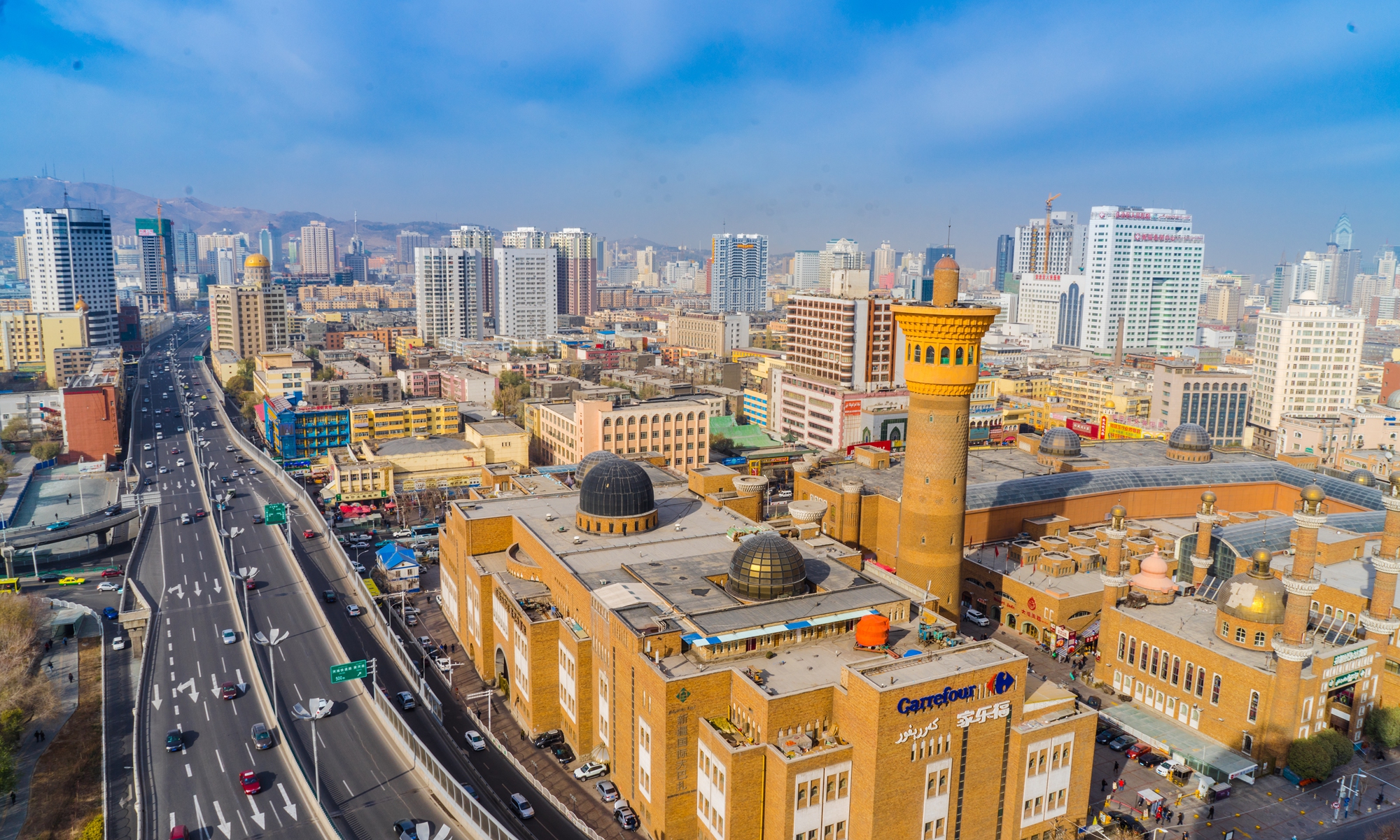
Xinjiang Photo: IC
No independence or professionalism
There is nothing about "independence" of BBC's reporting as it has been funded by the UK government and has been required to cooperate with the "deep state," said Zhao Chen, a research fellow at the Institute of European Studies under the Chinese Academy of Social Sciences.
The military and intelligence agencies of the UK together with other members of the Five Eyes have strengthened sharing information and cooperation in containing China, but as they felt the increasing difficulties in doing so, they started the "narrative wars" against China, together with the media, think tanks and political elites, Zhao noted.
The expert said that BBC has under duel pressure recently - limited government grant due to the influence of the COVID-19 pandemic and the fierce competition to win audiences against Netflix. It is now making China as a target by hyping sensational topics to shift domestic attention from government's failure in dealing with the pandemic and to burnish its image as "human rights defender."
Zhao noted that the UK's recent harsh remarks on China's Xinjiang and Hong Kong have caused confrontational feelings among the two people and would do no good to the China-UK ties.
The recent BBC's distorted reports have sparked heated discussions among Chinese netizens especially after Britain's Ofcome revoked the license of CGTN, a Chinese media, and some netizens called China to hit back.
Dong nonetheless disapproves the voices on Chinese social media that call to cancel visas of BBC correspondents in China, or to revoke license of BBC to broadcast or report in China, saying that keeping the doors open is the best way to face rumors and smears.
There are always people in the UK who believe in what BBC reports about China, no matter how unreliable its articles are, Dong said. "It shows there are indeed many British who know little about China," he noted.
China, therefore, can encourage instead of prevent British people visiting, and welcome them to see how a real Xinjiang is in person, Dong suggests.
"Then the world will see which one enjoys more freedom, when the UK tries every means to restrain Chinese media while China keeps itself open," he told the Global Times.
There has always been a misconception in China that if China returns to the international stage, those who built the stage will recognize China and treat China fairly, but in fact they will not, Shen Yi, a professor at the School of International Relations and Public Affairs of Fudan University in Shanghai, told the Global Times, noting that the faster China develops, the more negatively it will be viewed in the international community.
To tackle the media like BBC, China has to set up game rules, and the first step is to carry out an accurate rebuttal of the false claims and present facts, Shen said.
He also suggested China to establish credit files and drive out those who violate the professional ethics of journalism and engage in things inconsistent with their own duties.
